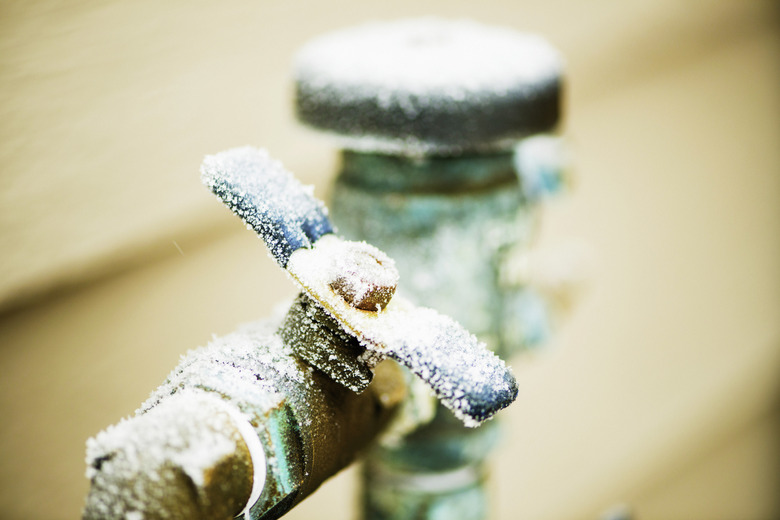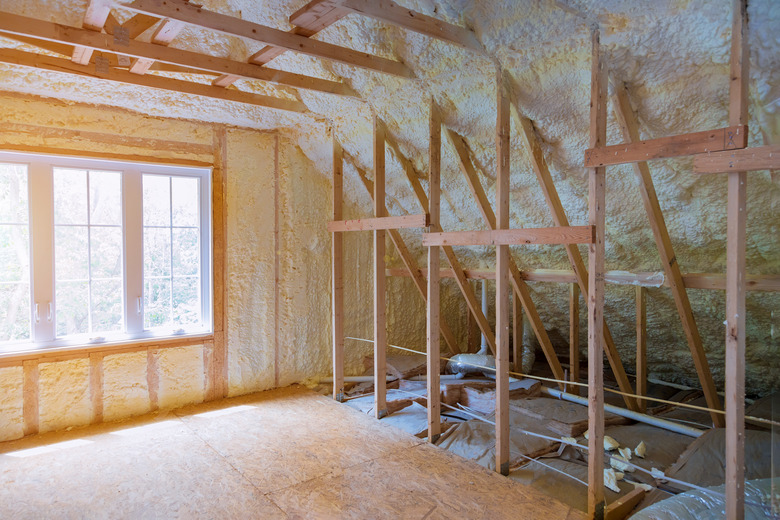The 9 Best Ways To Prevent Frozen Pipes
We may receive a commission on purchases made from links.
One of the worst dangers that freezing weather presents to a home is the risk of frozen pipes that can easily burst and cause major water damage. Repairing broken water pipes is relatively inexpensive, but the water damage that can result from a burst pipe can cost many thousands of dollars. While the greatest threat involves exterior pipes and those in unheated interior spaces filled with cold air — like a basement, garage or crawl space — even pipes inside your home can freeze and burst when the temperature drops below freezing. Fortunately, there are many things homeowners can do to help reduce the chance of burst pipes due to freezing weather.
Why Do Frozen Pipes Burst?
Why Do Frozen Pipes Burst?
It all comes down to chemistry and physics. Water expands to around 9 percent of its original volume when it freezes. At the same time, the water is still trapped inside the pipes, being steadily pressurized by the spreading ice until the walls of the pipe can't hold it in anymore. In fact, while the pressure of water inside a pipe is usually only around 40 pounds per square inch (PSI), the pressure inside a freezing pipe can go as high as 40,000 PSI. Because water pipes simply aren't designed to hold in that kind of pressure, they eventually burst. While pipes sometimes burst where ice has formed, it usually occurs further down the pipe where the pressure pushes on a weak spot.
1. Learn Your Water System
1. Learn Your Water System
The best way to be prepared for frozen pipes is to understand your water system. Learn where the main shutoff valve is located in your home so you know where you can shut off your water in case of an emergency. (If you're unsure of its location, look around your garage, basement or laundry room. In cold-weather climates, shutoff valves are almost always located indoors.) You may even want to turn off the water if only for a second just to verify that the valve turns properly. If it is stuck, apply penetrating oil and try turning it with a plumbers' wrench. If this fails, it's time to call a plumber.
Another great preventative measure is to trace where your pipes go through your home and outdoors so you can identify how big of a risk the freezing temperatures present to your pipes, since those located outdoors and in uninsulated areas of your home are more likely to burst. This will allow you to determine the right measures to protect your pipes.
Finally, determine which rooms in your house that contain pipes are the coldest so you can recognize when temperatures get too low in those areas. You might even get a freeze alarm that will notify you with a cellphone alert when temperatures go below 45 degrees Fahrenheit in these rooms so you can take preventative measures before it's too late. Many of these devices will also alert you if your pipes begin leaking so you can turn off the water as soon as possible, minimizing the damage if your pipe does burst.
2. Call a Professional
2. Call a Professional
Before winter comes, have a heating system professional perform a tune-up to help keep your HVAC system working through the cold months, reducing the danger to your indoor pipes. This can also help keep your home cozier and your energy bill lower.
If you're not sure where your pipes are located or where they may run through the walls of your home, you can have a plumber perform an inspection to identify potential trouble spots. A plumber can also teach you about options for protecting pipes during cold weather.
3. Better Insulate Your Home
3. Better Insulate Your Home
One of the best things you can do to prevent frozen pipes is to increase the insulation in the areas where your pipes run before cold weather hits. Check that you have sufficient insulation in your attic, crawl space and garage. This won't just help protect pipes in those areas but will also keep your home warmer and reduce your energy costs. While checking on the insulation, also keep an eye out for any drafts coming from openings or cracks in the walls, near the foundation or around windows and doors. Use caulk to seal gaps or cracks around vents, doors and windows.
4. Insulate Your Pipes
4. Insulate Your Pipes
Add self-sealing pipe sleeve insulation around all of your exterior pipes and pipes located in unheated areas, like the garage, basement and crawl space. Pipe insulation won't increase the temperature of your pipes or the water inside, but it can help keep the temperature of the pipe itself closer to the temperature of the water inside, reducing the likelihood that a cold pipe will freeze the water inside. If water is exposed to freezing temperatures in other parts of the pipe or if the cold is enough to come through your insulation, though, the pipes may still freeze and burst.
5. Use Heat Tape or Cables
5. Use Heat Tape or Cables
If you're really concerned about frozen pipes, try wrapping them with heat tape or heat cable connected to a thermostat controller so the tape or cable turns on when the temperature drops below the set level. This is generally only recommended for exterior pipes or interior pipes along an exterior wall. Always use these products according to manufacturer recommendations because using them incorrectly can result in a fire hazard.
6. Protect Your Sprinkler System
6. Protect Your Sprinkler System
In the fall, disconnect any garden hoses and put them away. Turn off your sprinkler system timer and use the shutoff valve to turn off the water to the sprinklers and then blow out the water. Most modern homes have frostproof faucets that drain themselves, but if you live in an older home, you'll need to turn off the water to your outdoor faucets, drain the water and then tightly turn the handles to ensure they are fully off before covering each one with a foam faucet cover. Wrap any drained above-ground pipes with insulation and for exterior pipes that still contain water, use heat tape or heat cable to protect the pipes.
7. Circulate Warm Air Around Pipes
7. Circulate Warm Air Around Pipes
Keeping your garage door closed helps protect pipes in the garage from freezing temperatures. For pipes inside the home, open your under-sink cabinet doors to allow warm air to circulate around the pipes.
For the same reason, keep your thermostat on even when you're going to be away from home for a while since this also keeps your pipes warm. If you know that your pipes go through a particularly cold area in your home that doesn't get enough heat, like a constantly chilly bathroom, you may even want to run a space heater on low during really chilly times to maintain sufficient heat in the room. However it should be noted that you should never run space heaters when you are not at home.
8. Leave the Water Running
8. Leave the Water Running
If you like to save water or money, you probably hate leaving the water running, but when temperatures are well below freezing, this is a good way to prevent freezing pipes. Remember that running water to prevent your pipes from bursting will save a lot of water and money compared to the alternative. For every sink in your home, turn on the hot water tap and cold water tap (or set a one-handled tap right in the middle) to ensure water is flowing through both pipes. Even just running water at a tiny trickle can prevent frozen pipes.
9. Take Precautions While Traveling
9. Take Precautions While Traveling
If you're planning on leaving town for a long period (particularly during the winter), use the shutoff valve to turn off your water supply lines. Next, drain the water from the pipes and don't forget to drain your hot water heater too. Because draining all the water from your pipes and hot water heater is a pretty major undertaking, it's best to leave your heat on as usual to keep your pipes warm inside your home if you're going on a shorter trip.
You might also want to give a key to a neighbor or friend so that person can take a quick look around and check if your pipes have burst. Have the number of a licensed plumber available so that if you can't get back home to take care of the problem yourself, you'll have someone available to do so. You may also consider installing an automatic shutoff valve that will turn off your water if it detects a leak.

